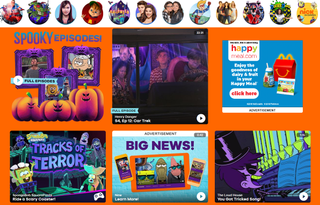Cable Pitches Looser Kids’ Regs at FCC

WASHINGTON — Cable companies looking to compete with over-the-top for little hearts and minds want some help from the Federal Communications Commission. While the agency’s plans to revamp current kids’ TV rules are mostly aimed at broadcasters, cable operators also have a puppy in the fight.
Providers want the FCC to loosen its rules on displaying web addresses during children’s TV programming, arguing that there is no reason to require a noncommercial landing page or place other restrictions on web links in kids shows. Those restrictions keep them from placing ads on pages they already promote on their linear channels.
Rethink Four-Prong Test
In a filing with the FCC, NCTA–The Internet & Television Association proposed a rethink of the FCC’s four-prong test of whether a website can be displayed during kids shows.
Those restrictions have had “a significant impact on those very programmers that provide the most child-friendly programming” as they try to compete against unregulated Web outlets such as Netflix and YouTube, NCTA said.
That disparate regulatory treatment “undermines the ability of traditional networks to attract investment necessary to produce the quality children’s television programming that their viewers expect and enjoy,” the group said.
The FCC’s children’s TV rules limit the amount of commercial matter cable networks and broadcasters can run during kids programming, educational or otherwise (10.5 minutes on weekends, 12 on weekdays). The rules also say that a web address can only be displayed during children’s programming if:
Multichannel Newsletter
The smarter way to stay on top of the multichannel video marketplace. Sign up below.
• It offers a substantial amount of bona fide program-related or other noncommercial content;
• Is not primarily intended for commercial purposes;
• The website’s homepage and other menu pages are clearly labeled to distinguish the commercial from the noncommercial sections;
• The page of the website to which viewers are directed by the website address is not used for e-commerce, advertising or other commercial purposes (for example, contains no links labeled “store” and no links to another page with commercial material).
NCTA called the 12-year-old guidance “narrowly tailored,” saying it no longer holds, if it ever did.
Rather than prevent the circumvention of ad limits in linear programming, the rules “heavily regulate the look and feel of children’s programmer Web sites,” the NCTA said. The rules also hamper the ability to promote the sites, which the group argued “often contain material intended to deepen the narrative with little monetary value to advertisers.”
NCTA calls that a regulatory overreach not supported in the Children’s TV Act. It also says the test is confusing, redundant and does not fit non-broadcast programmers that are not subject to the educational/informational mandate.
“For example, if ‘clearly labeling’ commercial content is sufficient to help children differentiate advertising from other content — and it is — there is no legitimate reason to prohibit programmers from including such content on the site’s ‘landing page,’ ” NCTA said.
As for the fourth prong of the test — no advertising on a landing page — “If it ever was the case, requiring children’s television programmers to wrap their website in an artificial landing page is not necessary today to protect children online,” the group said.
Critic: NCTA Is Breaking Promise
Center for Digital Democracy executive director Jeff Chester, a longtime critic of media online ad practices, said that children still need to be protected from big media with designs on little eyeballs.
“The NCTA is breaking — again — another promise it made to American families,” Chester said. “It said it would embrace the public interest policies to protect children from unfair ad practices. The FCC should actually open up an investigation into all the ways that cable companies are stealthily gathering personal data on subscribers and using it to turbocharge their advertising.
“It’s beyond laughable that some of the wealthiest media companies on the planet — AT&T, Viacom, Disney and Comcast — can’t invest some of their huge and monopolistic-based revenues on education shows for kids,” Chester said. “These companies also partner with Netflix and Google/YouTube, so it’s disingenuous for them to claim they are somehow being harmed by their allies.”
Contributing editor John Eggerton has been an editor and/or writer on media regulation, legislation and policy for over four decades, including covering the FCC, FTC, Congress, the major media trade associations, and the federal courts. In addition to Multichannel News and Broadcasting + Cable, his work has appeared in Radio World, TV Technology, TV Fax, This Week in Consumer Electronics, Variety and the Encyclopedia Britannica.

